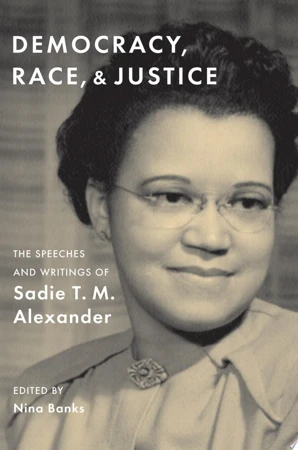Democracy, Race, and Justice – The Speeches and Writings of Sadie T. M. Alexander

Blurb
The first book to bring together the key writings and speeches of civil rights activist Sadie Tanner Mossell Alexander--the first Black American economist In 1921, Sadie Tanner Mossell Alexander became the first Black American to gain a Ph.D. degree in economics. Unable to find employment as an economist because of discrimination, Alexander became a lawyer so that she could press for equal rights for African Americans. Although her historical significance has been relatively ignored, Alexander was a pioneering civil rights activist who used both the law and economic analysis to challenge racial inequities and deprivations. This volume--a recovery of Sadie Alexander's economic thought--provides a comprehensive account of her thought-provoking speeches and writings on the relationship between democracy, race, and justice. Nina Banks's introductions bring fresh insight into the events and ideologies that underpinned Alexander's outlook and activism. A brilliant intellectual, Alexander called for bold, redistributive policies that would ensure racial justice for Black Americans while also providing a foundation to safeguard democracy.Comment from our editors:
This new book by Nina Banks expertly compiles the work of one of its pioneers, Sadie T.M. Alexander. Sadie Alexander was the first African American women to get a PhD in Economics, but has been forgotten by much of the profession due to discrimination and structural exclusion, phenomenon that are only now being recognized widely as a problem in Economics about a 100 years after Alexander received her doctorate. Banks documents how discrimination kept Sadie Alexander from being employed in the Economics academy, despite her many accomplishments, and how she also faced discrimination as a lawyer, which she trained as after the Economics profession failed to hire her. Nonetheless, Alexander continued to write about the economic and social conditions of African Americans and continued to, along with her husband, mount legal challenges to racial exclusion in Pennsylvania. The relevance of Alexander’s works today is put quite poignantly by Banks herself, and definitely merits reading:
“Remarkably, and tragically, the themes that our nation’s first African American economist addressed a hundred years ago with the beginning of African American migration to northern cities remain urgent, unaddressed problems today: chronic unemployment, confinement in urban slums, police brutality, voter suppression, poverty, inferior schools, substandard housing, and unsafe neighborhoods. I hope that reading Sadie Alexander’s speeches will motivate readers to think about the limitations, costs, and tremendous toll that anti-Blackness imposes on the lives of Black people as well as our larger communities, and to take action to correct the deep injustices that flow from it.”
By Diversifying and Decolonizing Economics

